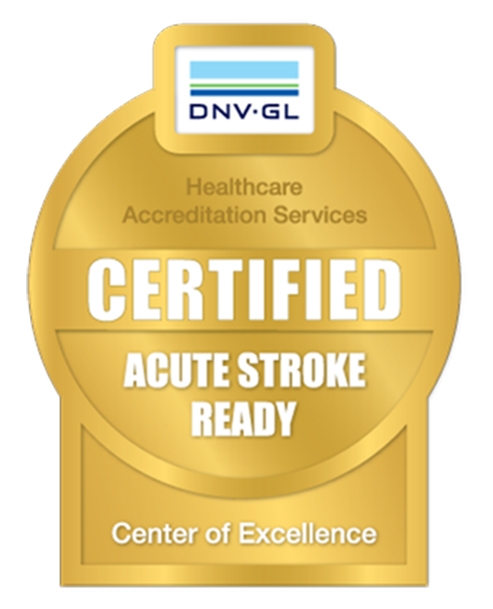McLeod Health Receives Acute Stroke Ready Stroke Certification

McLeod Health recently announced that it has received certification affirming its hospitals are equipped to provide care to patients with acute stroke symptoms who seek life-saving treatment from the emergency department. The certification granted by DNV GL Healthcare, designates McLeod Health as Acute Stroke Ready.
McLeod Health hospitals are some of the first in the state of South Carolina to become Acute Stroke Ready by DNV, a certification body that helps hospitals achieve excellence by improving quality and safety through hospital accreditation. The McLeod hospitals that achieved this designation include McLeod Health Cheraw, McLeod Health Clarendon, McLeod Health Dillon, McLeod Health Loris and McLeod Health Seacoast.
McLeod Regional Medical Center is certified as a Primary Stroke Center by DNV. McLeod was the first hospital in the region to be named a certified Primary Stroke Center in 2014. This year as the teams were preparing for their Acute Stroke Ready designation, the MRMC team was preparing for its re-certification.
“This certification is an acknowledgement to our community that we have the resources and commitment to provide the best possible stroke care,” said Dr. Timothy Hagen, Medical Director of Stroke and Neurology Services for McLeod Regional Medical Center. “It is a combination of the right equipment, personnel and training to quickly assess and treat strokes. As an Acute Stroke Ready hospital, we have the ability to administer intravenous thrombolytic therapy also known as tPA. This is the only FDA approved treatment for strokes that are caused by a blood clot that is interrupting blood flow to a region of the brain.
“Stroke is the leading cause of disability in the United States and fifth leading cause of death. One third of all patients have their first stroke prior to age 65. This is why the exceptional stroke care we provide for our patients, and improving the care overall for our community is so crucial,” explained Dr. Hagen.
The DNV GL Healthcare Acute Stroke Ready Certification is based on standards set forth by the Brain Attack Coalition and the American Stroke Association, and affirms that the medical centers address the full spectrum of stroke care – diagnosis, treatment, rehabilitation and education – and establish clear metrics to evaluate outcomes.
Acute Stroke Ready hospitals are designed to be part of a larger stroke system of care. For any stroke patient needing ongoing care after the initial treatment that care would be provided within the McLeod Health system at the Primary Stroke Center, McLeod Regional Medical Center.
Committed to the care of the stroke patient, McLeod Regional Medical Center opened the first Stroke Unit in the region in 2000. It is dedicated exclusively to the treatment and care of patients who have suffered a stroke. The 17-bed unit is staffed by specialty trained nurses who recognize even subtle changes in their patients’ condition.
“Achieving certification shows commitment to excellence,” says Patrick Horine, CEO of DNV GL Healthcare. “And it helps demonstrate to your community that you are performing at the highest level.”
According to the National Stroke Association, stroke kills nearly 130,000 each year. Because stroke or “brain attack” effects blood flow to the brain, rapid and effective treatment can save lives and provide the best chance of limiting the extent of long-term damage.
It is essential to help prevent a stroke from occurring by seeking medical treatment quickly at the first onset of symptoms. Everyone should be able to recognize stroke symptoms and act quickly.
“It is a team effort beginning with Emergency Management Services (EMS). EMS pre-alerts the Emergency Department so the Stroke Team can be waiting on the patient when they arrive,” added Dr. Hagen.
Common stroke symptoms in both men and women include:
- Sudden numbness or weakness of face, arm or leg — especially on one side of the body
- Sudden confusion, trouble speaking, or understanding
- Sudden trouble seeing in one or both eyes
- Sudden trouble walking, dizziness, loss of balance or coordination
- Sudden severe headache with no known cause.
Call 911 immediately if you have any of these symptoms.
Remember F.A.S.T.
If you think someone may be having a stroke, act F.A.S.T. and do this simple test:
F – FACE: Ask the person to smile. Does one side of the face droop?
A – ARMS: Ask the person to raise both arms. Does one arm drift downward?
S – SPEECH: Ask the person to repeat a simple phrase. Is their speech slurred or strange?
T – TIME: If you observe any of these signs, call 9-1-1 immediately.
-
McLEOD REGIONAL MEDICAL CENTER FLORENCE
843-777-2000 -
McLEOD DARLINGTON
843-777-1100 -
McLEOD DILLON
843-774-4111 -
McLEOD LORIS
843-716-7000 -
McLEOD SEACOAST
843-390-8100 -
McLEOD CHERAW
843-537-7881 -
McLEOD CLARENDON
803-433-3000



-
McLEOD REGIONAL MEDICAL CENTER FLORENCE
843-777-2000 -
McLEOD DARLINGTON
843-777-1100 -
McLEOD DILLON
843-774-4111 -
McLEOD LORIS
843-716-7000 -
McLEOD SEACOAST
843-390-8100 -
McLEOD CHERAW
843-537-7881 -
McLEOD CLARENDON
803-433-3000
 Find a Doctor
Find a Doctor  Locations
Locations  Services
Services